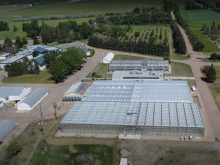Prairie grain farmers are not benefiting from the free trade
agreements, said the former president of the National Farmers Union.
Nettie Wiebe told a panel discussion on the agriculture crisis at the
University of Regina that, during consultation in the mid-1980s,
farmers heard only positive things about free trade.
“Grain farmers stood back and said, ‘don’t worry. We’ve always been in
the global marketplace.’ “
Almost 14 years after the Canada-U.S. Free Trade Agreement was
Read Also

Manitoba beekeepers battle for survival
Honeybee colony losses have hit 43 per cent, making 2025 the latest in a string of poor bee survival years for Manitoba’s honey producers
implemented, consumers have benefited through a widely available
variety of food at relatively low cost.
“And, you have the sense that there is plenty,” she said.
But Wiebe said the other side of the story is that the tremendous
variety of food comes at a considerable price in other areas.
Since 1988, realized net farm income has dropped 24 percent when
adjusted for inflation, she said.
Exports have nearly tripled and farm debt has doubled.
“We’re growing more, we’re exporting more and we’re making less,” Wiebe
said. “That’s the story for us farmers.”
There has been consolidation throughout the industry, job loss and
fewer farmers. People no longer have neighbours or facilities close by.
And globalization has made competition more acute.
“Even if you are a large farmer in Saskatchewan you’re a tiny,
minuscule bargainer around a negotiating table,” Wiebe said.
She said experts have to recognize the human issues around
globalization and trade agreements.
“The data doesn’t support the thesis that this kind of agriculture is
sustainable,” she said.















